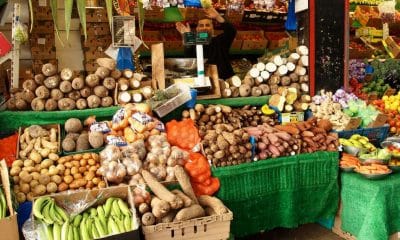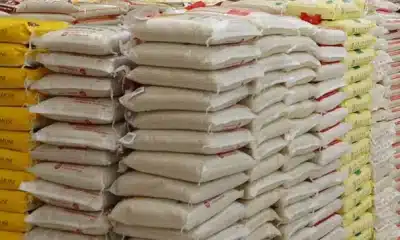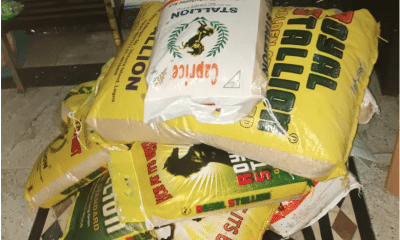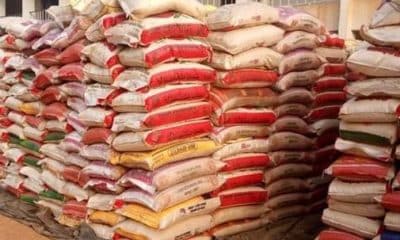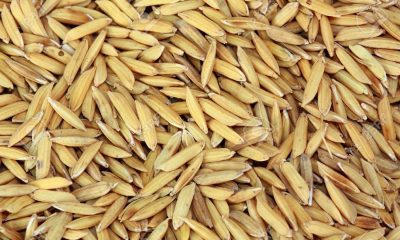Gist
Current Price Of 50kg Bag Of Rice In Nigeria
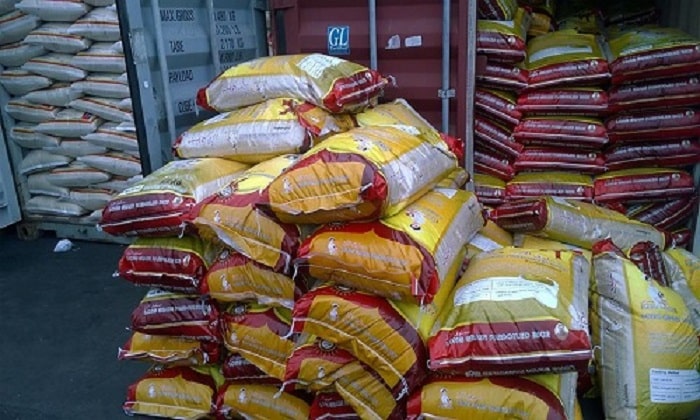
The Nigerian rice market is witnessing fluctuating trends with the price of a 50kg bag currently on the rise, maintaining its level since last month.
Notably, locally produced Nigerian rice offers a more economical option compared to its foreign counterparts, with various packaging sizes available to meet consumer demand.
Rice in Nigeria is available in several package sizes, including 50kg, 25kg, 10kg, and 5kg bags, catering to different market segments.
A standard 50kg bag encompasses 13 custard paint rubber buckets, with each bucket weighing approximately 4kg. Furthermore, this size equates to 33 mudu or 54 derica, providing a gauge for consumers to measure and purchase rice according to their needs.
The cost of rice varies significantly between local and imported brands. As of March 20, 2024, the average price for a 50kg bag of foreign rice stands at N60,000, while a 25kg half-bag is priced at N40,000.
In contrast, Nigerian rice is tagged at N70,000 for a 50kg bag and N35,000 for a 25kg bag, reflecting the premium on locally sourced grains.
Additionally, a single derica of rice is currently valued at ₦1,800, with a paint bucket fetching around ₦7,500.
The Nigerian market is flooded with a variety of rice brands, each vying for consumer preference. Some of the prominent names include My Food, Mama Gold, My Choice, Royal Stallion, Cap Rice, Uncle Ben’s Rice, and Mama’s Pride.
These brands offer different quality levels and price points, contributing to the diverse selection available to Nigerian consumers.
The Nigerian rice market is experiencing fluctuations influenced by various factors, with significant contributions from the top rice-producing states in the country.
The price of rice, a staple food in Nigeria, varies considerably due to elements like production volume, transportation costs, and market demand.
Factors Influencing Rice Prices
1. Production Volume: The yield from rice-producing states plays a crucial role in determining the market price. Higher production typically leads to lower prices, while scarcity due to poor harvests can drive prices up.
2. Transportation And Logistics: The cost of moving rice from farms to markets affects its final price. Longer transport routes and poor road conditions can increase these costs significantly.
3. Market Demand: As a staple food, rice has a constant high demand. Seasonal spikes, such as during festive periods, can further strain the supply and push prices up.
4. Importation: Dependence on imported rice to supplement local production also affects pricing, with import duties and exchange rates influencing cost.
5. Government Policies: Subsidies, tariffs, and support for local farmers can impact the price of rice. Policies promoting local rice production aim to reduce reliance on imports and stabilize prices.
Leading Rice-Producing States
Nigeria’s rice production landscape is dominated by several states, known for their substantial contributions to the national rice supply:
– Kebbi State: Often hailed as the rice production hub of Nigeria, Kebbi leads in terms of output, largely due to government and private sector initiatives like the Anchor Borrowers’ Programme.
– Ebonyi State: Known for its high-quality local rice, Ebonyi has invested significantly in enhancing its rice production capabilities, positively affecting its local economy and reducing prices.
– Benue State: Dubbed the “Food Basket of the Nation,” Benue contributes immensely to Nigeria’s rice production, with its favorable agricultural climate.
– Anambra State: With initiatives to boost rice production, Anambra has seen a rise in output, particularly with the popular Anambra Rice brand.
– Nasarawa State: Its strategic location near major markets like Abuja has made Nasarawa a key player in the rice production sector.

